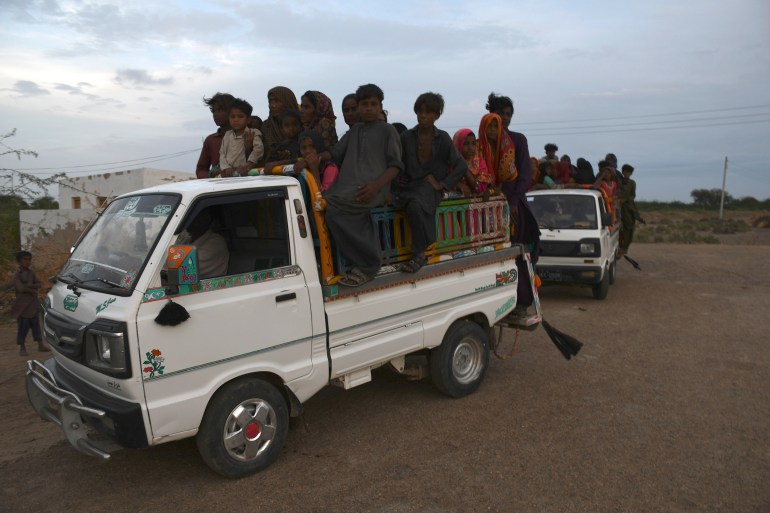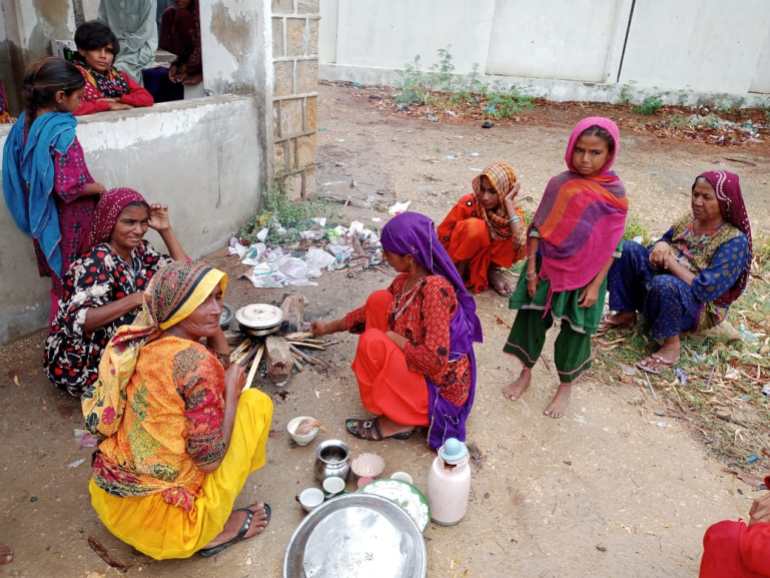Islamabad, Pakistan – Two days before Cyclone Biparjoy was expected to land, fisherman Murtazza Jati and his wife grabbed all they could carry and fled their village in the southern province of Sindh.
As the couple waited out the storm in one of the dozens of relief camps set up by the provincial government, one question haunted Jati: Would his fishing boat still be there when he returned to Ishaque Taimoor village?
“I had no choice but to leave my boat behind. My livelihood is dependent on it,” Jati told Al Jazeera by phone on Wednesday. “The government informed us on June 10 to not go back to the sea until the cyclone ends, and three days later, they informed people of our village to evacuate.”
More than 80,000 people have been displaced from their homes along the coastal belt in Sindh province as the country braces for the storm’s impact. Classified as a “very severe cyclonic storm”, Biparjoy was expected to make landfall sometime on Thursday evening.
The 30-year-old fisherman said he does not know what he and the other villagers will do if the storm takes his boat while he waits at the camp in Jati town, nearly 30 kilometres (18 miles) from the coast.
“Building one boat cost over 400,000 rupees ($1,400), and if the cyclone destroys my boat, or other 20-25 boats of other fishermen in our village, I cannot imagine what will we do then,” Jati said.

Ali Muhammad, another fisherman from Ishaque Taimoor village staying at a relief camp, said that he, too, had to leave most of his possessions behind as he rushed to leave. Muhammad was also worried about what would remain when he returned home after the storm, especially the chickens he left behind.
“I have three chickens at my home, and I am so worried for them. I just hope they somehow survive,” he told Al Jazeera.
The cyclone has winds recorded at between 150 to 160km/h (93 to 99mph), according to the latest data from Pakistan Meteorological Department (PMD).
Sardar Sarfaraz, the chief of the PMD, said on Wednesday that the cyclone’s latest position showed it was likely to strike the border areas between Rann of Kutch in India and Keti Bandar in Pakistan, which is just south of Jati and Muhammad’s village.
“It is easily the biggest cyclone in our region since 1999 which has come so close to our shoreline. There have been other large cyclones in the past, but none came so close to the border,” he said, adding that his department is in close communication with its neighbour’s counterpart, the Indian Metrological Department (IMD).
“We have a WhatsApp group, including other member countries, and we constantly exchange updates as well as emails,” he said.

Noor Muhammed Taimur, a social activist affiliated with Pakistan Fisherfolk Forum, a rights organisation for fishermen, was forced to flee on Tuesday from Ishaque Taimoor village with 18 family members and shelter on the compound of a government school in Jati town.
“We barely got any time to pack up anything. We just picked up some ration and utensils, some bed sheets, and our solar panel and battery to charge phones, leaving rest in the hands of God,” he told Al Jazeera.
He was grateful for the government relief camps and said that families have been provided food and potable water.
“At night, they also give temporary electricity that helps us keep some light bulbs on, but there is no fan. Thankfully, it is quite windy, and it is drizzling sporadically, so we are getting by,” he said.
However, the 51-year-old recalls the damage done during the 1999 Keti Bandar, a category 3 storm on the Saffir-Simpson scale. It resulted in the deaths of 6,200 people in Sindh province, where Biparjoy is also likely to hit.
“Back then, we lost more than 400 fishermen from our village alone. So many people died back then,” Taimur said. “We are now sitting here, waiting and praying, and just hoping we can go back to our homes and find it standing.”

Maqsood Jokhio, a provincial official supervising a relief camp for evacuees from the Keti Bandar area, told Al Jazeera that the government is doing its best to aid displaced people.
“We have cooked food, drinking water as well as medical assistance to those coming to relief camps,” he said.
However, Jokhio said it was difficult to convince the fishermen and families to leave their homes and wait out the storm in the relief camps.
“When we started the evacuation, many did not take us seriously and said this will pass, this is our life, we know what is going on,” Jokhio said, adding that eventually people agreed and are now safely in the camps.
“We just hope that the cyclone does not cause too much damage,” he said.

World - Latest - Google News
June 15, 2023 at 12:03AM
https://ift.tt/OxZLPKU
Pakistan villagers fear what Cyclone Biparjoy will take away - Al Jazeera English
World - Latest - Google News
https://ift.tt/iYqwjOA
https://ift.tt/UzBLKhv
Bagikan Berita Ini














0 Response to "Pakistan villagers fear what Cyclone Biparjoy will take away - Al Jazeera English"
Post a Comment